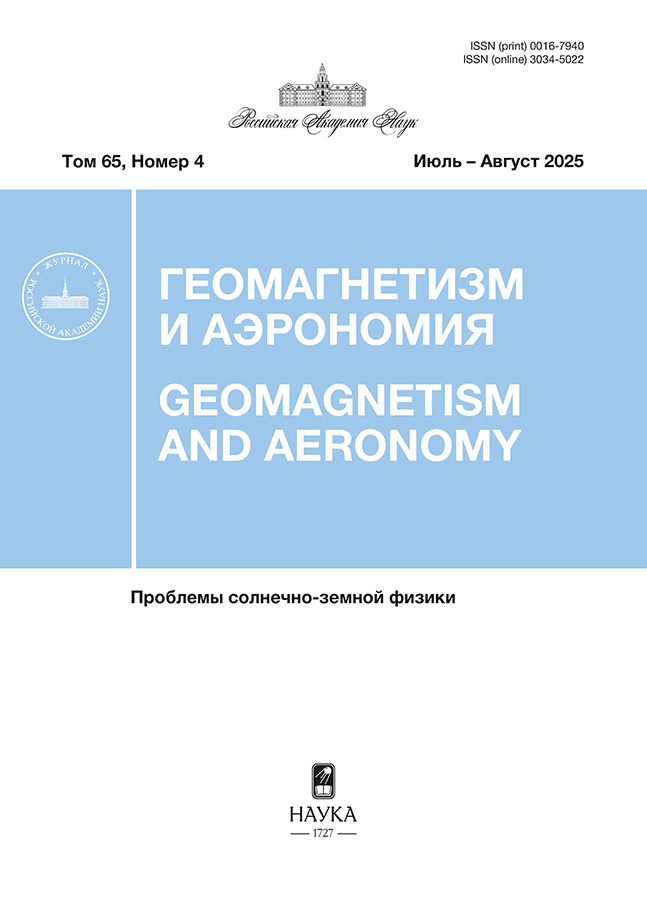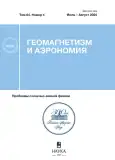Вариация несущей частоты серпентинной эмиссии в условиях спокойной магнитосферы
- Авторы: Куражковская Н.А.1, Клайн Б.И.1, Куражковский А.Ю.1
-
Учреждения:
- Институт физики Земли им. О.Ю. Шмидта РАН
- Выпуск: Том 64, № 4 (2024)
- Страницы: 479-488
- Раздел: Статьи
- URL: https://gynecology.orscience.ru/0016-7940/article/view/650918
- DOI: https://doi.org/10.31857/S0016794024040039
- EDN: https://elibrary.ru/RTSWEN
- ID: 650918
Цитировать
Полный текст
Аннотация
По данным регистрации магнитного поля в Антарктической обсерватории Восток (исправленные геомагнитные координаты F'=−85.41°, L'=69.01°) за период 1970‒1972 гг. исследована вариация несущей частоты fSE серпентинной эмиссии, наблюдаемой в диапазоне частот 0.1‒5.0 Гц в условиях спокойной магнитосферы (Kp ~ 0‒2). Используя динамические спектры УНЧ-излучений, проанализировано 90 случаев наблюдения серпентинной эмиссии, центральная несущая частота которых плавно снижалась (в несколько раз, иногда до 0) и затем возрастала практически до первоначального уровня на интервалах времени, значительно превышающих максимальный период модуляции (1 ч). При этом типичная модуляция несущей частоты эмиссии с периодами 1‒60 мин сохранялась. Наиболее вероятное время наблюдения обнаруженного эффекта приходилось на предполуночные часы. Показано, что снижение fSE и последующее ее возрастание наблюдалось на фоне слабой геомагнитной активности и относительной стабильности доминирующего числа параметров солнечного ветра и ММП. Учитывая обнаруженное синхронное совпадение поведения fSE динамики величины AE-индекса, а также наблюдение эффекта понижения несущей частоты вблизи местной полуночи, предполагается, что вероятнее всего серпентинная эмиссия возбуждается вблизи полярного каспа и затем проникает в область полярной шапки. Наблюдавшееся на длительных интервалах времени поведение fSE предположительно контролируется плазменным параметром β и отношением плотности протонов к плотности ионов гелия Np/Na, динамика которых аналогична средней вариации fSE.
Об авторах
Н. А. Куражковская
Институт физики Земли им. О.Ю. Шмидта РАН
Автор, ответственный за переписку.
Email: knady@borok.yar.ru
Геофизическая обсерватория “Борок” (ГО “Борок” ИФЗ РАН)
Россия, пос. Борок, Ярославская обл.Б. И. Клайн
Институт физики Земли им. О.Ю. Шмидта РАН
Email: klain@borok.yar.ru
Геофизическая обсерватория “Борок” (ГО “Борок” ИФЗ РАН)
Россия, пос. Борок, Ярославская обл.А. Ю. Куражковский
Институт физики Земли им. О.Ю. Шмидта РАН
Email: ksasha@borok.yar.ru
Геофизическая обсерватория “Борок” (ГО “Борок” ИФЗ РАН)
Россия, пос. Борок, Ярославская обл.Список литературы
- Гульельми А.В., Троицкая В.А. Геомагнитные пульсации и диагностика магнитосферы. М.: Наука, 208 с. 1973.
- Гульельми А.В., Довбня Б.В. Гидромагнитное излучение межпланетной плазмы // Письма в ЖЭТФ. Т. 18. № 10. С. 601–604. 1973.
- Гульельми А.В., Довбня Б.В., Клайн Б.И. Возбуждение геомагнитных пульсаций типа “серпентинная эмиссия” в межпланетной плазме // Доклады Академии наук СССР. Т. 221. № 6. С. 1314‒1317. 1975.
- Гульельми А.В., Потапов А.С., Довбня Б.В. О происхождении частотной модуляции серпентинной эмиссии // Солнечно-земная физика. Т. 1. № 2. С. 85–90. 2015. https://doi.org/10.12737/9617
- Довбня Б.В., Зотов О.Д., Клайн Б.И., Куражковская Н.А. Динамика излучения типа SE перед мощными протонными вспышками на Солнце // Геомагнетизм и аэрономия. Т. 34. № 3. С. 188–191. 1994.
- Довбня Б.В., Клайн Б.И., Гульельми А.В., Потапов А.С. Спектр частотной модуляции серпентиной эмиссии как отражение спектра солнечных колебаний // Солнечно-земная физика. Т. 3. № 1. С. 59–62. 2017. https://doi.org/10.12737/23043
- Довбня Б.В., Потапов А.С. Исследование частотной модуляции серпентинной эмиссии // Физика Земли. № 5. С. 19–26. 2018. https://doi.org/10.1134/S0002333718050058
- Куражковская Н.А., Клайн Б.И., Лавров И.П. Длиннопериодные иррегулярные пульсации в условиях спокойной магнитосферы // Геомагнетизм и аэрономия. Т. 56. № 3. С. 314–323. 2016. https://doi.org/10.7868/S0016794016030111
- Куражковская Н.А., Клайн Б.И. Эффект прерывания серпентинной эмиссии (SE) в полярной шапке во время внезапных начал геомагнитных бурь (SSC) // Геомагнетизм и аэрономия. Т. 62. № 5. С. 617–626. 2022. https://doi.org/10.31857/S0016794022040101
- Куражковская Н.А., Клайн Б.И. Особенности поведения излучения типа SE во время суббурь // Геомагнетизм и аэрономия. Т. 63. № 2. С. 163–173. 2023. https://doi.org/10.31857/S0016794022600521
- Пилипенко В.А., Довбня Б.В., Мартинес-Беденко В.А., Добровольский М.Н. Геомагнитные наблюдения на станции Восток советских Антарктических экспедиций: научная проблематика и архив данных // Вестник ОНЗ РАН. Т. 12. NZ4003. 2020. https://doi.org/10.2205/2020NZ000366
- Fuselier S.A., Klumpar D.M. Shelley E.G. He2+ and H+ dynamics in the subsolar magnetosheath and plasma depletion layer // J. Geophys. Res. – Space. V. 96. № 12. P. 21095–21104. 1991. https://doi.org/10.1029/91JA02145
- Guglielmi A., Potapov A., Dovbnya B. Five-minute solar oscillations and ion-cyclotron waves in the solar wind // Solar Phys. V. 290. № 10. P. 3023–3032. 2015. https://doi.org/10.1007/s11207-015-0772-2
- Hsu T.-S., McPherron R.L. Average characteristics of triggered and nontriggered substorms // J. Geophys. Res. – Space. V. 109. № 7. ID A07208. 2004. https://doi.org/10.1029/2003JA009933
- Loewe C.A., Prӧlss G.W. Classification and mean behavior of magnetic storms // J. Geophys. Res. – Space. V. 102. № 7. P. 14209‒14213. 1997. https://doi.org/10.1029/96JA04020
- Phan T.D., Gosling J.T., Paschmann G., Pasma C., Drake J.F, Øieroset M., Larson D., Lin R.P., Davis M.S. The dependence of magnetic reconnection on plasma β and magnetic shear evidence from solar wind observation // Astrophys J. Lett. V. 719. № 2. P. L199–L203. 2010. https://doi.org/10.1088/2041-8205/719/2/L199
- Song P., Gombosi T.I., DeZeeuw D.L., Powell K.G., Groth C.P.T. A model of solar wind‒magnetosphere‒ionosphere coupling for due northward IMF // Planet. Space Sci. V. 48. № 1. P. 29‒39. 2000. https://doi.org/10.1016/S0032-0633(99)00065-3
- Wang X., Tu C.-Y., He J.-S., Wang L.-H. Ion-scale spectral break in the normal plasma beta range in the solar wind turbulence // J. Geophys. Res. – Space. V. 123. № 1. P. 68–75. 2018. https://doi.org/10.1002/2017JA024813
Дополнительные файлы








